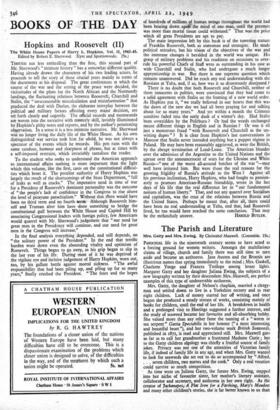BOOKS OF THE DAY
Hopkins and Roosevelt (II)
The White House Papers of Harry L. Hopkins. Vol. II, 1942-45. Edited by Robert E. Sherwood. (Eyre and Spottiswoode. 25s.)
THOUGH not less enthralling than the first, this second part of Mr. Sherwood's " intimate history " has a somewhat different quality. Having already drawn the characters of his two leading actors, he proceeds to tell the story of these crucial years mainly in terms of the documents at his disposal. The great conferences at which the course of the war and the setting of the peace were decided, the vicissitudes of the plans for the North African and the Normandy landings, the fluctuating relations between Roosevelt, Churchill and Stalin, the " ungccountable miscalculation and misinformation " that produced the deal with Darlan, the elaborate interplay between the political and military factors affecting every major decision, are set forth clearly and cogently. The official records and memoranda are woven into the narrative with masterly skill, lavishly illuminated by Hopkins's pithy notes and reports, and by the author's penetrating observation. In a sense it is a less intimate narrative. Mr. Sherwood was no longer living the daily life of the White House. As his own distinguished war service took him far afield, he was not always a spectator of the events which he records. His pen runs with the same candour, humour and sharpness of phrase, but at times with a self-imposed restraint, which invariably tantalises the reader.
To the student who seeks to understand the American approach to international affairs nothing is more important than the light which this volume, like the first, casts on the constitutional difficul- ties which beset it. The peculiar authority of Harry Hopkins was largely the result of the shortcomings of the State Department, " full of leaks as well as cracks." The imperative need in time of war for a President of Roosevelt's dominant personality was the outcome of " the people's lack of confidence in the Congress to rise above the level of picayune parochialism." Without that there would have been no third term and no fourth berm Although Roosevelt him- self and Truman after him have -done something to bridge the constitutional gulf between the White House and Capitol Hill by associating Congressional leaders with foreign policy, few Americans would quarrel with Mr. Sherwood's judgement that " our need for great men in the Presidency will continue, and our need for great men in the Congress will increase."
In the final analysis everything depended, and still depends, on " the solitary power of the President." In the end that terrific burden wore down even the abounding vitality and optimism of Roosevelt. Things began to go awry, as his grip began to slip in the last year of his life. During most of it he was deprived of the vigilant eye and incisive judgement of Harry Hopkins, worn out, too, by his gallant battle against mortal sickness. "The awful responsibility that had been piling up, and piling up for so many years," finally crushed the President. " The fears and the hopes
of hundreds of millions of human beings throughout the world had been bearing down upor the mind of one- man, until the pressure was more than mortal tissue could withstand." That was the price which all great Presidents are apt to pay.
The main impression left by this book is of the towering stature of Franklin Roosevelt, both as statesman and strategist. He made political mistakes, but his vision of the objectives of the war and the immense changes it heralded in the world was unique. His grasp of military problems and his readiness on occasions to over- ride his powerful Chiefs of Staff were as outstanding in his case as with- Churchill and Stalin, who had undergone a much longer apprenticeship in war. But there is one supreme question which remains unanswered. Did he reach any real understanding with the Russians at Yalta, and, if so, how was it so disastrously dissipated ?
There is no doubt that both Roosevelt and Churchill, neither of them innocents in politics, were convinced that they had come to a solid agreement with Stalin on the framing of a new world order. As Hopkins put it, " we really believed in our hearts that this was the dawn of the new day we had all been praying for and talking about for so many years." And yet within a month the Crimean sunshine faded into the early dusk of a winter's day. Had Stalin been overridden by the Politburo ? Or had the words exchanged meant different things in English and in Russian ? Or was it all just a monstrous fraud " with Roosevelt and Churchill as the un- witting dupes " ? It is clear from Hopkins's last conversations in Moscow that Stalin never intended anything but a puppet regime in Poland. He may have been reasonably aggrieved, as were the British, by the abrupt termination of Lend-Lease. The American blunder over the admission of the Argentine to the United Nations and the uproar over the announcement of seats for the Ukraine and White Russia—" one of the worst all-around botches of the war "—may well have irritated him. But were those the real reasons for the growing frigidity of Russia's attitude to the West ? Against all his previous inclination, Harry Hopkins, who had fought so passion- ately to promote American-Russian friendship, wrote in the last days of his life that the real difference lay in " our fundamental notions of human liberty." That, and not any quarrel over Socialism and capitalism, was the crux of the relations between Russia and the United States. Perhaps he meant that, after all, there could have been no real understanding at Yalta, and that, had Roosevelt lived, he too would have reached the same conclusion. That may


































 Previous page
Previous page